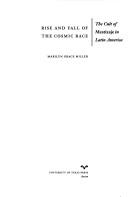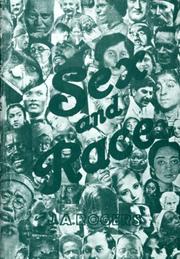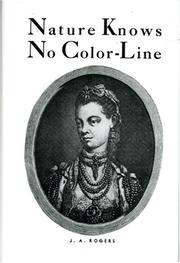| Listing 1 - 10 of 29 | << page >> |
Sort by
|
Book
ISBN: 0815309791 Year: 1993 Volume: 7 Publisher: New York (N.Y.) : Garland,
Abstract | Keywords | Export | Availability | Bookmark
 Loading...
Loading...Choose an application
- Reference Manager
- EndNote
- RefWorks (Direct export to RefWorks)
Croisement de races --- Hybridity of races --- Hybridité raciale --- Miscegenation --- Métissage --- Racial amalgamation --- Racial crossing --- Rassenvermenging --- African Americans --- Miscegenation. --- Racism --- White supremacy movements --- History --- United States --- 19th century --- Race relations --- 1863-1877 --- 1877-1964
Book
ISBN: 9782872099863 2872099867 Year: 2010 Volume: 8 Publisher: Louvain-la-Neuve : Academia-Bruylant,
Abstract | Keywords | Export | Availability | Bookmark
 Loading...
Loading...Choose an application
- Reference Manager
- EndNote
- RefWorks (Direct export to RefWorks)
Le phénomène imprévisible et non maîtrisable du métissage à la fois fascine et inquiète. Mais peut-on logiquement penser cette donne désormais incontournable, et avec l'aide de quelle instrumentation intellectuelle ? Préfacées par Jean-Luc Bonniol, ces Variations métisses tentent une approche originale de cette interrogation en convoquant dix intellectuels francophones de ce dernier siècle, choisis tant en fonction de la variété des courants de pensées qui les habitent que de la diversité de leur discipline : Victor Segalen, Claude Lévi-Strauss, Roger Bastide, Gilles Deleuze avec Félix Guattari, Georges Balandier, Paul Ricoeur, René Depestre, Serge Gruzinski, Jean-Loup Amselle et François Laplantine avec Alexis Nouss. S'attachant aux développements de ces auteurs, l'étude met en évidence que chacun d'entre eux privilégie une métaphore, outil par excellence d'une connaissance suggestive et non figée du penser métis : celle du Divers, du bricolage, de la mosaïque, du rhizome, du désordre, de la narration, de l'ajout, du mélange, du branchement, de l'oscillation. Des figures diversifiées qui permettent à chaque fois d'appréhender d'autres modalités et logiques à l'oeuvre dans les différentes manières de percevoir et d'interpréter ce processus irrésistible de métissage nous obligeant aujourd'hui, face aux mutations contemporaines, à repenser nos anciennes perspectives, valeurs et catégories anthropologiques. Et sans pour autant prétendre cerner et définir cette notion si mouvante et complexe qui, toujours, se dérobe.
Acculturation --- Miscegenation --- Métissage --- Croisement de races --- Hybridity of races --- Hybridité raciale --- Métissage --- Racial amalgamation --- Racial crossing --- Rassenvermenging --- Race Relations --- Racially mixed people --- Acculturation. --- Cultural fusion --- Ethnology --- Philosophy --- Ethnology - Philosophy --- Miscegenation (Racist theory)
Book
ISBN: 9782707139825 2707139823 Year: 2007 Volume: *4 Publisher: Paris : La Découverte,
Abstract | Keywords | Export | Availability | Bookmark
 Loading...
Loading...Choose an application
- Reference Manager
- EndNote
- RefWorks (Direct export to RefWorks)
Pendant la colonisation française, des dizaines de milliers d'enfants sont nés d'" Européens " et d'" indigènes ". Souvent illégitimes, non reconnus puis abandonnés par leur père, ces métis furent perçus comme un danger parce que leur existence brouillait la frontière entre " citoyens " et " sujets " au fondement de l'ordre colonial. Leur situation a pourtant varié : invisibles en Algérie, ils ont été au centre des préoccupations en Indochine. La " question métisse " a également été posée à Madagascar, en Afrique et en Nouvelle-Calédonie. Retraçant l'histoire oubliée de ces enfants de la colonie, cet ouvrage révèle une face cachée, mais fondamentale, de l'histoire de l'appartenance nationale en France : il montre comment les tentatives d'assimilation des métis ont culminé, à la fin des années 1920, avec des décrets reconnaissant la citoyenneté à ceux qui pouvaient prouver leur " race française ". Aux colonies, la nation se découvrait sous les traits d'une race. Cette législation bouleversa le destin de milliers d'individus, passant soudainement de la sujétion à la citoyenneté : ainsi, en Indochine, en 1954, 4 500 enfants furent séparés de leur mère et " rapatriés " en tant que Français. Surtout, elle introduisait la race en droit français, comme critère d'appartenance à la nation. Cela oblige à revoir le " modèle républicain " de la citoyenneté, fondé sur la figure d'un individu abstrait, adhérent volontaire à un projet politique commun et à souligner les liens entre filiation, nationalité et race.
Racially mixed people --- Miscegenation --- Métis --- Métissage --- Colonies --- History --- Histoire --- France --- History. --- Hybridity of races --- Racial amalgamation --- Racial crossing --- Race relations --- Bi-racial people --- Biracial people --- Interracial people --- Mixed race people --- Mixed-racial people --- Mulattoes --- Multiracial people --- Peoples of mixed descent --- Ethnic groups --- Métis --- Métissage --- Colonies&delete& --- Nationalité --- Citoyenneté --- Statut juridique --- Miscegenation (Racist theory)
Book
ISBN: 9783034316057 9783035202953 Year: 2015 Publisher: Berne : P. Lang,
Abstract | Keywords | Export | Availability | Bookmark
 Loading...
Loading...Choose an application
- Reference Manager
- EndNote
- RefWorks (Direct export to RefWorks)
Ces seize textes étudient les conditions d'unions interculturelles, dans les sociétés coloniales, qui ont provoqué l'apparition de nouvelles générations métisses, ainsi qu'un phénomène de créolisation. Ils examinent le contexte et les circonstances dans lesquels ces populations se sont mélangées et la position des métis dans les nouvelles sociétés, du Canada à la Bolivie, de l'Algérie à l'Angola. ©Electre 2015
Intercountry marriage --- Mariage interethnique --- Miscegenation --- Interracial marriage --- Racially mixed people --- 392.4/.5 "05/17" --- Bi-racial people --- Biracial people --- Interracial people --- Mixed race people --- Mixed-racial people --- Mulattoes --- Multiracial people --- Peoples of mixed descent --- Ethnic groups --- Intermarriage --- Hybridity of races --- Racial amalgamation --- Racial crossing --- Race relations --- Colonies --- Verloving. Huwelijk. Huwelijksgebruiken. Partnerkeuze. Polyandrie. Polygamie. Monogamie--Nieuwe Tijd --- Conferences - Meetings
Book
ISBN: 9788484896425 8484896420 9783954877621 3954877627 9783954877638 3954877635 Year: 2019 Publisher: Madrid : Frankfurt am Main : Iberoamericana ; Vervuet,
Abstract | Keywords | Export | Availability | Bookmark
 Loading...
Loading...Choose an application
- Reference Manager
- EndNote
- RefWorks (Direct export to RefWorks)
"En Blancura y otras ficciones, la doctora López Rodríguez se enfoca en un tema que recientemente ha sido más tratado por antropólogos e historiadores que por críticos literarios: la emergencia, en el siglo XIX, de ‘tipos’ racializados republicanos y de identidades regionales racializadas en Colombia. Lo hace abordando, con inédita precisión, la cuestión de cómo los intelectuales colombianos del período entendieron la ‘blancura’. Más específicamente, examina cómo los habitantes de los Andes nororientales fueron ‘blanqueados’ retóricamente tanto en la escritura de ficción como en las artes visuales, trabajando con textos publicados, canónicos y no canónicos, así como con ilustraciones, complementadas con algunos documentos de archivo. Un proyecto interdisciplinario que aporta sensibilidad y penetración a una gama de materiales y temas que cruzan los habituales límites disciplinarios." "Este libro desestabiliza nuestro entendimiento del mestizaje en el siglo XIX, tema sobre el cual hemos impuesto un modelo que realmente viene del siglo XX sin examinar los textos y documentos decimonónicos. Mercedes López sustenta claramente un argumento centrado en la importancia de la blancura para esta región, un análisis más matizado de lo que significaban esas categorías para un público escritor decimonónico."
Littérature colombienne --- Histoire et critique --- Colombian literature --- Latin American literature --- POLITICAL SCIENCE / Public Policy / Social Policy. --- Miscegenation --- Race discrimination --- Mestizaje --- Discriminación racial --- History. --- Historia. --- Bias, Racial --- Discrimination, Racial --- Race bias --- Racial bias --- Racial discrimination --- Discrimination --- Hybridity of races --- Racial amalgamation --- Racial crossing --- Race relations --- Racially mixed people --- Miscegenation (Racist theory)

ISBN: 0292705727 0292705964 0292797206 Year: 2004 Publisher: Austin, Tex. University of Texas Press
Abstract | Keywords | Export | Availability | Bookmark
 Loading...
Loading...Choose an application
- Reference Manager
- EndNote
- RefWorks (Direct export to RefWorks)
Mestizaje in literature --- Mestizaje --- Miscegenation --- Hybridity of races --- Racial amalgamation --- Racial crossing --- Race relations --- Racially mixed people --- Mestizo culture --- Mestizo-ization --- History --- Latin America --- Asociación Latinoamericana de Libre Comercio countries --- Neotropical region --- Neotropics --- New World tropics --- Spanish America --- Civilization --- Race relations. --- Sociology of minorities --- Thematology --- Spanish-American literature --- History of civilization
Book
ISBN: 1283834774 0813929857 9780813929859 9781283834773 9780813927770 0813927781 9780813927787 0813927773 Year: 2009 Publisher: Charlottesville University of Virginia Press
Abstract | Keywords | Export | Availability | Bookmark
 Loading...
Loading...Choose an application
- Reference Manager
- EndNote
- RefWorks (Direct export to RefWorks)
Racially mixed people --- African Americans --- Whites --- Miscegenation --- Hybridity of races --- Racial amalgamation --- Racial crossing --- Race relations --- Negritude --- Race identity. --- Race identity --- History. --- Ethnic identity --- Hemings, Sally. --- Jefferson, Thomas, --- Relations with slaves. --- Relations with women. --- United States --- Race relations. --- Race question --- Hemings, Sarah --- Hemmings, Sally --- Hemmings, Sarah --- White persons --- Ethnology --- Caucasian race --- White people --- Miscegenation (Racist theory) --- Multiracial people
Book
ISBN: 0814790488 9780814790489 9780814772492 0814772498 9780814772508 0814772501 9780814772515 081477251X Year: 2013 Publisher: New York, NY
Abstract | Keywords | Export | Availability | Bookmark
 Loading...
Loading...Choose an application
- Reference Manager
- EndNote
- RefWorks (Direct export to RefWorks)
Barack Obama’s historic presidency has re-inserted mixed race into the national conversation. While the troubled and pejorative history of racial amalgamation throughout U.S. history is a familiar story, The United States of the United Races reconsiders an understudied optimist tradition, one which has praised mixture as a means to create a new people, bring equality to all, and fulfill an American destiny. In this genealogy, Greg Carter re-envisions racial mixture as a vehicle for pride and a way for citizens to examine mixed America as a better America.Tracing the centuries-long conversation that began with Hector St. John de Crevecoeur’s Letters of an American Farmer in the 1780s through to the Mulitracial Movement of the 1990s and the debates surrounding racial categories on the U.S. Census in the twenty-first century, Greg Carter explores a broad range of documents and moments, unearthing a new narrative that locates hope in racial mixture. Carter traces the reception of the concept as it has evolved over the years, from and decade to decade and century to century, wherein even minor changes in individual attitudes have paved the way for major changes in public response. The United States of the United Races sweeps away an ugly element of U.S. history, replacing it with a new understanding of race in America.
Post-racialism --- United States --- Miscegenation --- Racially mixed people --- Color blindness (Race relations) --- Colorblindness (Race relations) --- Post-racial society --- Postracialism --- Race blindness --- Race relations --- Hybridity of races --- Racial amalgamation --- Racial crossing --- Bi-racial people --- Biracial people --- Interracial people --- Mixed race people --- Mixed-racial people --- Mulattoes --- Multiracial people --- Peoples of mixed descent --- Ethnic groups --- History. --- Miscegenation (Racist theory)

ISBN: 0819575569 9780960229413 9780819575562 Year: 2012 Publisher: St. Petersburg, FL
Abstract | Keywords | Export | Availability | Bookmark
 Loading...
Loading...Choose an application
- Reference Manager
- EndNote
- RefWorks (Direct export to RefWorks)
Classic work of black study provides detailed historico-biographical surveys of black history
Miscegenation. --- African Americans. --- Blacks. --- Race relations. --- Integration, Racial --- Race problems --- Race question --- Relations, Race --- Ethnology --- Social problems --- Sociology --- Ethnic relations --- Minorities --- Racism --- Negroes --- African Americans --- Afro-Americans --- Black Americans --- Colored people (United States) --- Africans --- Blacks --- Hybridity of races --- Racial amalgamation --- Racial crossing --- Race relations --- Racially mixed people --- Black persons --- Black people --- Black people. --- Miscegenation (Racist theory).

ISBN: 0819575518 9780819575517 9780960229451 Year: 2014 Publisher: [Place of publication not identified]
Abstract | Keywords | Export | Availability | Bookmark
 Loading...
Loading...Choose an application
- Reference Manager
- EndNote
- RefWorks (Direct export to RefWorks)
In Nature Knows No Color-Line, originally published in 1952, historian Joel Augustus Rogers examines the origins of racial hierarchy and the color problem. Rogers was a humanist who believed that there were no scientifically evident racial divisions--all humans belong to one "race." He believed that color prejudice generally evolved from issues of domination and power between two physiologically different groups. According to Rogers, color prejudice was then used a rationale for domination, subjugation and warfare. Societies developed myths and prejudices in order to pursue their own interests at the expense of other groups. This book argues that many instances of the contributions of black people had been left out of the history books, and gives many examples.
Racially mixed people. --- Miscegenation. --- Black race. --- Negro race --- Race --- Hybridity of races --- Racial amalgamation --- Racial crossing --- Race relations --- Racially mixed people --- Bi-racial people --- Biracial people --- Interracial people --- Mixed race people --- Mixed-racial people --- Mulattoes --- Multiracial people --- Peoples of mixed descent --- Ethnic groups --- Miscegenation --- United States --- Race relations. --- Race question --- Multiracial people. --- Miscegenation (Racist theory).
| Listing 1 - 10 of 29 | << page >> |
Sort by
|

 Search
Search Feedback
Feedback About UniCat
About UniCat  Help
Help News
News